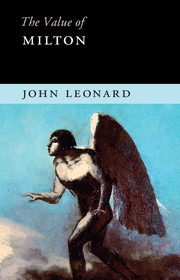Book contents
- Frontmatter
- Dedication
- Contents
- Preface
- Textual note
- 1 Areopagitica, toleration and free speech
- 2 The minor poems and ‘the power / to save’
- 3 The political prose: ‘in liberty's defence’
- 4 Paradise Lost, the sublime poem
- 5 Paradise Lost, ‘solid good’
- 6 Paradise Regained, ‘To the utmost of mere man’
- 7 Samson Agonistes, tragedy and terror
- Notes
- Index
7 - Samson Agonistes, tragedy and terror
Published online by Cambridge University Press: 05 July 2016
- Frontmatter
- Dedication
- Contents
- Preface
- Textual note
- 1 Areopagitica, toleration and free speech
- 2 The minor poems and ‘the power / to save’
- 3 The political prose: ‘in liberty's defence’
- 4 Paradise Lost, the sublime poem
- 5 Paradise Lost, ‘solid good’
- 6 Paradise Regained, ‘To the utmost of mere man’
- 7 Samson Agonistes, tragedy and terror
- Notes
- Index
Summary
Samson Agonistes has always excited strong passions. Discussion of the play has become especially heated since September 2001. The reason is obvious. Samson pushes down twin pillars, killing himself and thousands of people. How are we to judge this act? Stanley Fish thinks it beyond our judgment: ‘the only value we can put on Samson's action is the value he gives it … it is an expression, however provisional, of his reading of the divine will; and insofar as it represents his desire to conform to that will, it is a virtuous action. No other standard for evaluating it exists’. Fish finds Samson's act ‘praiseworthy because he intends it to be answerable to the divine will’. ‘Whether it is or not … he cannot know, nor can we’ and ‘in relation to the problem of judging him as a moral being, whether it is or not does not matter’. These words caused no stir when they first appeared in print. The year was 1969 and the twin towers were still under construction. Controversy erupted only when Fish's comment was reprinted in How Milton Works, a collection of old and new material that appeared in 2001. By the time the book reached the hands of the reviewers, the towers had fallen and Fish's argument no longer seemed academic. The sternest response was John Carey's ‘A Work in Praise of Terrorism? September 11 and Samson Agonistes’, published in the Times Literary Supplement on the first anniversary of the attacks. Quoting Fish's words as if they had been written on the eve of the attacks, Carey writes:
If Fish meant this to be provocative, he was, in my case, completely successful. To me his viewpoint seemed monstrous – a licence for any fanatic to commit atrocity. Then came September 11, and in the weeks that followed I could not keep his words out of my mind. I still cannot. The events of that day seem like a devilish implementation of his arguments.
Fish wrote a rebuttal in which he argued that he had simply been doing his job: ‘Carey seems to think that by giving this account of what Samson does, I endorse it … But I endorse nothing except my reading – I am doing literary criticism, not morality’.
- Type
- Chapter
- Information
- The Value of Milton , pp. 127 - 148Publisher: Cambridge University PressPrint publication year: 2016

